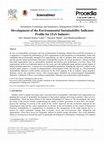Papers by Posi Olatubosun

International Journal of Sustainable Development & World Ecology, 2010
In view of sustainability in business and role of Information Technology enabled Services(ITeS) i... more In view of sustainability in business and role of Information Technology enabled Services(ITeS) in business, it is imperative to examine the performance of ITeS organizations on the parameters of sustainability. Some well established and professionally managed ITeS organizations are able to optimize their resource utilization and provide specific annual performance disclosure (sustainability) reports on various parameters, whereas medium and small organizations lack on sustainability standards and disclose poor performance over time. Since ITeS organizations neither use traditional inputs nor they come out with traditional output and have greater degree of human-machine interaction, it requires its own sustainability parameters. Keeping this objective, authors in this research paper propose a concept of Organisational e-Environment (OeE) and develop an e-Environmental Sustainability Indicator (e-ESI) profile exclusively for the ITeS segment of the IT industry using integrative literature review and experience survey. This research paper identified six e-Environmental Sustainability Indicators. Validation of these e-environment sustainability indicators are needed before implementation.

International Journal for Infonomics, Jun 30, 2022
Businesses, government agencies (including transport departments) face an evolving landscape of E... more Businesses, government agencies (including transport departments) face an evolving landscape of Environmental, Social and Governance (ESG)related risks that can impact their success and survival. In order to effectively cope with greater and widespread uncertainty, organizations must manage risk efficiently. This is particularly relevant for organizations in the transport sector, especially, as the nature of their operations is by default challenged by a diverse set of hazards and risks. Accordingly, this research proposes the development of a sustainable Enterprise Risk Management (ERM) framework that is specific in nature for the transport sector in the Global South (GS). Sustainable transport has a key part to play in fostering inclusive growth and expanding access to essential services, it is a vital driver of economic and social development linking people to jobs, education, health care, etc. Given the current attention on sustainable development, it is essential to identify the status of the transport sector in GS and the challenges to the development of a sustainable transport system. Academic and practice literature in the public domain have noted very limited literature focusing on aspects such as Agency, Program and Project risk management for strategic alignment, asset management and performance measure in the transport sector. Aside, various organisational and institutional challenges (such as poor policy and regulatory framework, understanding of the benefits and challenges of implementing ERM, Consideration of Transport Organisations (Internal and External) Context, Risk awareness culture, ERM alignment with key strategies and objectives, Coordination with different stakeholders; Lack of proper industry-specific guidance material; keeping up with the technology, budget constraints, lack of leadership commitment etc.) has been reported. It has also been established that Organizational resilience starts at the top with an Enterprise Risk Management (ERM) paradigm. However, despite several ERM frameworks developed, many organizations still face challenges in aligning ERM with their key strategies and objectives. This is because most of the existing frameworks lack implementation guidance and were often criticised for failing to consider the specificity of the organisations. Managing the complexity inherent in transport and logistics based on context has therefore, become a continuous test even for
International Journal of Sustainable Energy Development
International Journal of Sustainable Energy Development
The 11th International Conference in Critical Management Studies: Precarious Presents, Open Futures, Jun 27, 2019

Advances in Business Information Systems and Analytics, 2020
Description Defining the value of an entire company can be challenging, especially for large, hig... more Description Defining the value of an entire company can be challenging, especially for large, highly competitive business markets. While the main goal for many companies is to increase their market value, understanding the advanced techniques and determining the best course of action to maximize profits can puzzle both academic and business professionals alike. Valuation Challenges and Solutions in Contemporary Businesses provides emerging research exploring theoretical and practical aspects of income-based, market-based, and asset-based valuation approaches and applications within the financial sciences. Featuring coverage on a broad range of topics such as growth rate, diverse business, and market value, this book is ideally designed for financial officers, business professionals, company managers, CEOs, corporate professionals, academicians, researchers, and students seeking current research on the challenging aspects of firm valuation and an assortment of possible solution-driven concepts.
oikos Young Scholars Finance Academy 2017, Sep 4, 2017
Jean Monnet Module - Sustainable Finance: Roundtable Focusing on Investor Engagement, ESG and COVID-19, Jul 29, 2020

This exploratory work investigates the burgeoning integration of ‘cradle to cradle’ practices int... more This exploratory work investigates the burgeoning integration of ‘cradle to cradle’ practices into primary strategic activities of procurement, production and sales by ten London based fashion businesses, analysing how profits are derived from offsetting the high costs of sustainable inputs against savings from innovative strategic choices in the production value chain. This research was influenced by the background knowledge that in the global fashion industry, less than 1 per cent of the recycled textiles are converted into new wearable materials, and even more of these textiles end up in landfills. However, this unsustainable tradition in the fashion industry may gradually give way to a mainstream circular economic best practice in the fashion industry, even as the Mckinsey Report found that sustainability will be a significant factor for consumer purchasing mass market apparels by 2025. Based on the semi-structured interview of the ten fashion business owners and the analyses of...

The focus of Corporate Governance is shifting from the role of directors to active ownership. Bas... more The focus of Corporate Governance is shifting from the role of directors to active ownership. Based on their fiduciary duty to other shareholders, it is believed that institutional investors have an important role to play in this regard. However, the Pension Funds and the Sovereign Wealth Organisations are not driven by the same set of objectives. In addition, Environmental Social and Governance (ESG) issues in investment decision-making are now becoming more important and they are capable of becoming the mainstream in the future. However, there are widespread variations in perception of fiduciary responsibilities, ESG issues appraisal, as well as the strategies adopted by institutional investors on shareholder engagement as responsible investors. Responsible Investment market is largely driven by institutional investors and they are expected to continue to lead the way. This research work investigates the role of the main asset owners and their advisors in responsible investment pr...
This paper sets out to examine the application of Responsible Investment (RI) principles through ... more This paper sets out to examine the application of Responsible Investment (RI) principles through the lens of Ubuntu philosophy, as an alternative corporate governance approach. We seek to understand why African investment managers are more grounded in Western philosophies compared to Ubuntu. Data were collected via archival data on the Institutional investors’ Environmental, Social and Governance (ESG) practices in South Africa, and the interview of 7 institutional asset owners. Evidences indicate that apart from weak regulatory environment, corporate governance standards in many developing countries do not resonate with native cultural values and philosophies. Although the Ubuntu philosophy is a growing phenomenon, increase in contextualisation of its economic and financial cases through business education is warranted for it to be well grounded.

Advances in Business Information Systems and Analytics
This chapter investigates the challenges faced by sell-side analysts in engaging with companies w... more This chapter investigates the challenges faced by sell-side analysts in engaging with companies with material stranded assets through the lens of Becksian risk society theory. The research unravels the usefulness of sustainability reports in deriving the intrinsic value of energy companies in the UK, and whether they take Environmental Social and Governance (ESG) factors into consideration in doing so. Qualitative data were collected via dual methods comprising longitudinal participant observation at IR meetings and interview of sell-side analysts and institutional shareholder. Findings indicate dissatisfaction with the existing risk reporting system is a key factor in divestment decisions and asset stranding. The growing Responsible Investment (RI) awareness notwithstanding, the inadequate risk reporting system continues to represent a major source of agitation amongst shareholders and analysts, making the overhaul of the current financial reporting system inevitable.
African Virtue Ethics Traditions for Business and Management
Qualitative Research in Financial Markets, Nov 1, 2019











Uploads
Papers by Posi Olatubosun